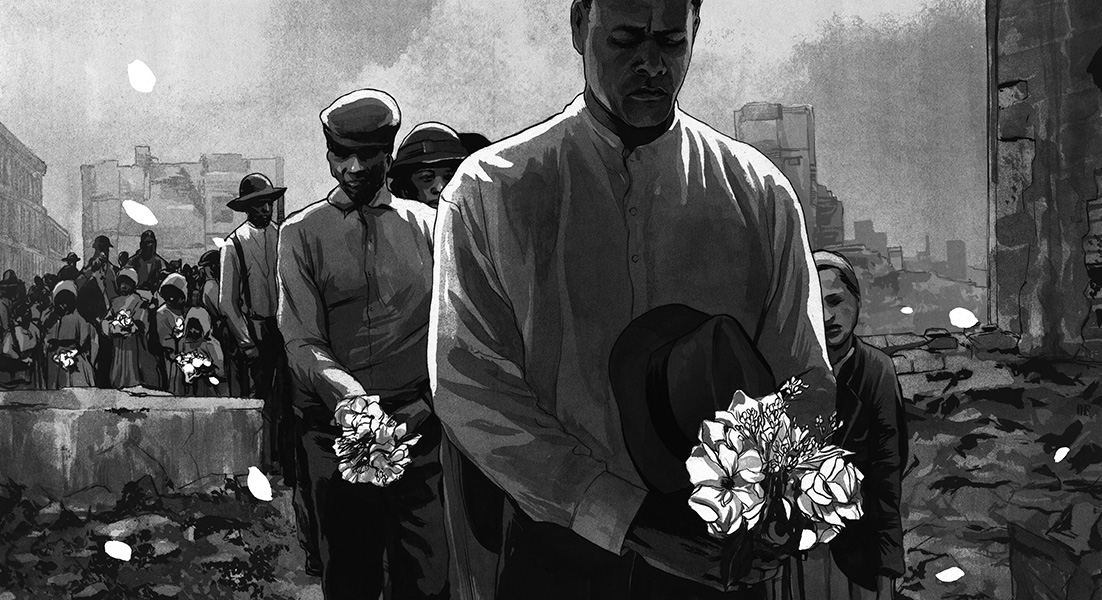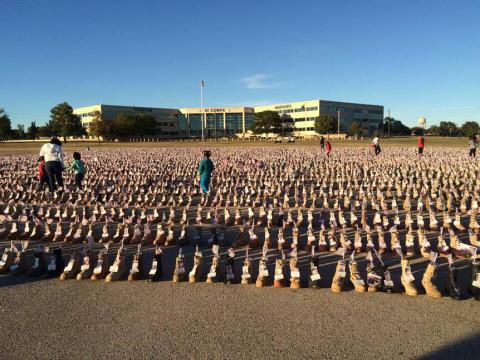May closes with Memorial Day, also called Decoration Day for the tradition of placing and planting flowers at the graves of war veterans. Freed slaves began this tradition, gathering on May 1, 1865 in Charleston, Virginia to commemorate the death of Union soldiers. It was officially proclaimed on May 5, 1868 and observed with different customs in northern and southern states. President Woodrow Wilson extended Memorial Day to honor military dead from World War I and all future wars.
This national holiday, which honors soldiers who lost their lives in war, poses many complexities. Recalling President's Lincoln's words in his Gettysburg address that "those who died shall not have died in vain," we recognize that Memorial Day does not distinguish, for example, between wars of justice like the Civil War and wars of aggression for control of natural (oil) and geopolitical dominance, in which young men and women lose their lives in vain. Who among us cannot name wars of the later 20th and early 21 st centuries where our government's motives were ambiguous, hidden from the public, or based on deceit? "In war," the Greek playwright Aeschylus wrote, "truth is the first casualty."
Another dilemma of this national holiday to remember the military war dead is that many military war dead are excluded. After being pressured in 2012 by reporters investigating military suicides, the Veterans' Administration estimated that 22 soldiers per day were committing suicide, this being an underestimate because neither the VA nor the Pentagon has an accurate number, nor maintains records on veterans who do not seek health care from the VA. That same year more soldiers killed themselves than died fighting in Afghanistan.
In Texas alone, investigative reporters unearthed data the VA did not or would not pursue, namely that the suicide rate among veterans of Iraq and Afghanistan wars was nearly five times that of the Texas population. Even more war veterans died from illness, accidents (risky driving, etc.) and overdoses of drugs prescribed for the emotional, mental and spiritual traumas of war they suffered. Thus, those killed in the midst of war are remembered honorably; and those who served side by side with them, but died later from the unrelenting damage of war, are forgotten.

Memorial Day, originally published in the New York Times, May 28, 2012. Illustration by the artist Owen Freeman.
credit - Owen Freeman
Three recent wars exposed soldiers to chemical weapons and poisons that have consigned many to a slow death, following years of illness and disability. The VA now associates a number of cancers, heart disease, diabetes 2, neuropathy, and Parkinson's disease suffered by Vietnam veterans, as well as birth defects in their children, with their exposure to the herbicide Agent Orange. However, it took veterans' advocates and their lawyers decades of confronting inept and corrupt government health studies and industry denial to overcome expedient myths and win VA health services and disability. Memorial Day does not encompass the military war dead who died after the war from exposure to chemical poisons on the battlefield.
More than 35 percent of the 1991 Gulf War veterans suffer from a mysterious, multi-symptomatic illness termed Gulf War Illness, including skin conditions; memory loss; joint, respiratory and GI tract problems, which may likely foreshorten their lives. Studies to date suggest that exposures to depleted uranium, experimental vaccines, pesticides, and extremely toxic air pollution from burning oil wells and chemical burn pits during that war are the cause. Gulf War Syndrome, a catchall for these mysterious and disabling symptoms and conditions suffered by hundreds of thousands of veterans of the three-week ground war (which killed fewer than 200 US soldiers) remains an unyielding conundrum.
Some 1,000 tons of radioactive depleted uranium (DU) were used by the US in the second war in Iraq to pierce metal tanks and concrete and steel structures, exposing soldiers and Iraqi citizens to radioactive dust and vapors after impact. Our country's decision to use DU in weapons was made in the context of intentional ignorance about the health risks to those exposed in conflict and post-conflict situations in Iraq.
Let us remember, then, this Memorial Day the men and women soldiers who have suffered and died from war-caused conditions called variably soldier's heart in the Civil War, shell shock in the First World War, PTSD in the Vietnam War, and moral injury in the Iraq War.
Let us not forget those who died from the nightmares of war - at their own hand. "The war is never over for those involved in it. It goes on for those damaged by it." remarked a woman soldier assigned as a mortuary affairs specialist to handle the maimed bodies of US soldiers killed by explosive devices in Afghanistan.
Let us remember all those veterans whose lives are foreshortened because of homelessness, unemployment employment, and the moral injury war.
Perhaps we should inaugurate another memorial day to remember all the war dead: call it a Day of Sorrow. By the end of the 20th century, 9 of 10 who died in war were civilians not military, of which the majority were women and children. An epidemic of cancers and birth defects ravages Iraq since our two wars there. In Vietnam, third and fourth generation children born to mothers exposed to Agent Orange dioxin have severe mental and physical handicaps.
If we remember publicly all the dead and dying from war, as we do on Memorial Day for (some) military war dead, then perhaps the tragedy of the many, many millions of wasted lives, those who did die in vain, would cry out - "war never again".
[Pat Hynes, a former Professor of Environmental Health writes and speaks on the health impacts of war and militarism. She directs the Traprock Center for Peace and Justice.]


Spread the word